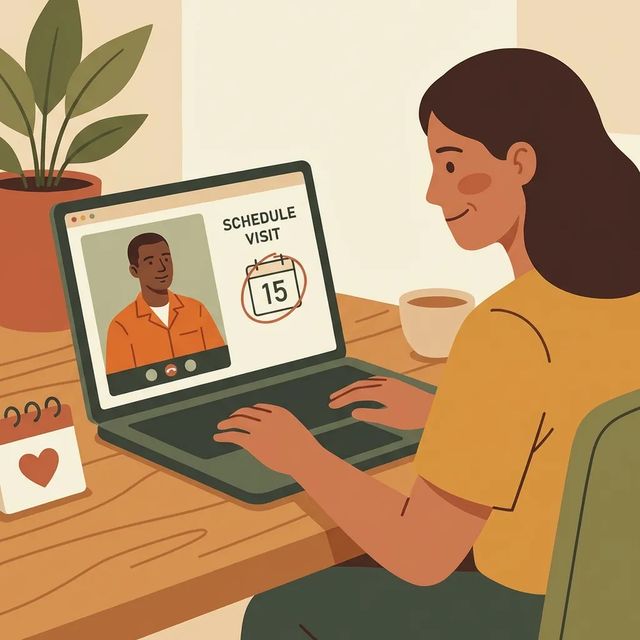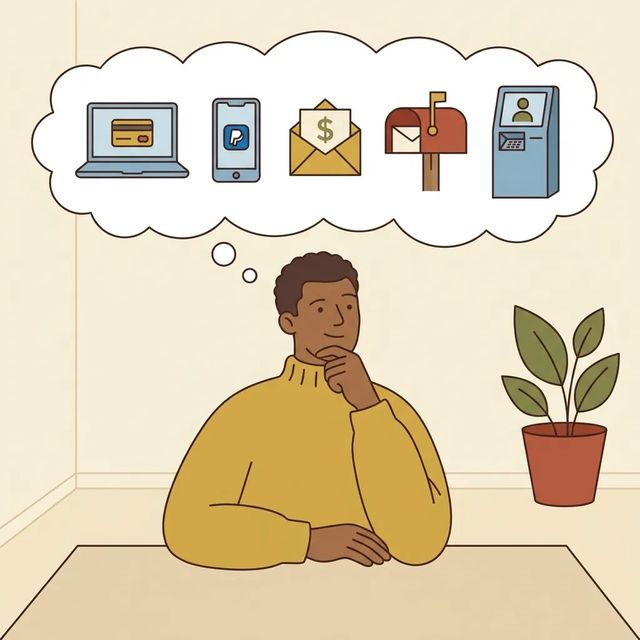Eddy County Detention Center, NM
Explore
Find an Inmate at Eddy County Detention Center, NM
Search for a loved one and send messages and photos in minutes.

Guides for This Facility

How to Set Up Video Visits with Someone at Eddy County Detention Center (Hours, Fee & Refunds)
Setting up a video visit at Eddy County Detention Center is straightforward once you know where to go, what it costs, and when visits are available. Here's what you need to get scheduled from home.
Read Guide
How to Set Up Your First Video Visit at Eddy County Detention Center
Setting up your first video visit at Eddy County Detention Center comes down to using the right system and working around posted hours. Here's how to make sure your first call goes smoothly.
Read Guide
Three Ways to Send Money to Someone at Eddy County Detention Center (Accounts, Phone Funds, & Care Packs)
Want to help someone at Eddy County Detention Center? Start by choosing the right deposit type. The jail uses three separate systems: one for general account/commissary money, one for phone funds only, and one for care packs.
Read GuideAt a Glance
Visitation
- All visits are conducted through video visitation and require creating an account at videovisitanywhere.com to schedule.
- A home video visit costs $10.99 for 20 minutes.
- Home video visitation hours are daily from 9:00 AM to 11:00 PM.
Communication
- Eddy County offers Securus AdvanceConnect, a prepaid calling account that lets users manage spending on incarcerated individual calling.
- Securus Direct Bill allows receiving calls billed directly to the recipient on monthly statements, and enrollment requires a credit check.
- To place or accept vendor-handled calls you generally need to create an account with the facility’s approved communications vendor and add funds or confirm billing arrangements.
Mail & Letters
- Eddy County Detention Center publishes a list of mail items that are considered contraband.
- The county package/care-pack vendor customer service number is 1-800-546-6283.
- Incoming mail is inspected by staff for contraband and prohibited content before delivery.
Sending Money
- You can add money to a detainee’s account via Access Corrections at 866-394-0490 or their website.
- Access Corrections advertises the ability to send money for bail and to make parole or probation payments.
- To add funds to a detainee’s phone account, contact Securus at 866-558-2323 or use the Securus website.
Inmate Lookup
- The Eddy County detainee lookup is available but does not display charge information.
- An alphabetical detainee roster is posted in Eddy County’s Reports section.
- For statewide prison records, use New Mexico’s offender search; county custody pages cover local jail records.
Contact Info
- The Artesia sub‑office is on the second floor of the Artesia Safety Complex at 3300 W Main St., Artesia, NM 88210.
- Most detention facilities publish a main phone line and an info desk or email for general and detainee inquiries.
- When contacting the facility, use the specific channel for your issue (commissary, visitation, records or detainee information) to get a faster response.
Facility Info
- A Registered Nurse is on duty at Eddy County Detention Center seven days per week, including holidays.
- Mental health services at the detention center are provided by Carlsbad Mental Health Center.
- Dental services are available at Eddy County Detention Center.
Based on official sources and community feedback. Learn how we verify
Topic Overviews
Visitation
All visits at Eddy County Detention Center happen by video. You'll need to create an account and schedule through videovisitanywhere.com. Home video visits cost $10.99 for 20 minutes, available daily from 9:00 AM to 11:00 PM. Missed a scheduled visit? Contact Securus Friends and Family through the vendor line to request a refund. First-time visitors go through the standard approval process: the inmate adds you to their list, you submit a visitor application, then register with the video vendor to book visits. Attorneys can arrange visits by contacting the facility in advance.
Read full guideCommunication
Eddy County Detention Center uses Securus for telephone communications. Want tight control over costs? Securus AdvanceConnect is a prepaid option—deposit funds and manage spending as you go. Prefer billing after the fact? Securus Direct Bill sends charges to you monthly, though you'll need to pass a credit check to enroll. Most people need to set up a vendor account and either add funds or confirm billing arrangements before calls will work. Since vendor systems often handle more than phone calls (electronic messaging, video visits), confirm account rules and any time or session limits before scheduling. Attorneys may have separate verification steps for privileged communications.
Read full guideMail & Letters
Before sending mail to Eddy County Detention Center, check the facility's published contraband list. Staff inspect all incoming mail and screen for prohibited content before delivery. Legal or privileged correspondence often gets handled differently—many facilities open or scan it in the inmate's presence—so verify whether Eddy County follows similar procedures. To help your mail get processed smoothly, include the inmate's full name and ID number, the facility name and state, and your complete return address. For vendor or care-pack questions, call 1-800-546-6283 and confirm any limits on pages, photos, or items.
Sending Money
Sending money to someone at Eddy County Detention Center? Deposits go through Access Corrections—call 866-394-0490 or use their website. Access Corrections also handles bail payments and parole or probation payments. For phone calls specifically, you'll add money through Securus by calling 866-558-2323 or using the Securus website. Care packs can be ordered at nmcountypackages.com, with a $50 monthly spending limit. Have the inmate's full name and facility ID ready when making any deposit.
Read full guideCommon Questions
Showing 6 of 22Does Eddy County Detention Center allow in-person visits or only video visits?
Visits happen through video only, scheduled via videovisitanywhere.com. In-person contact visits aren't indicated, so check the vendor scheduling options for available visit types.
VisitationHow much does a video visit cost and when can I schedule one at Eddy County?
Home video visits cost $10.99 for 20 minutes. Home video visitation hours are listed as daily from 9:00 AM to 11:00 PM.
VisitationWhat should I do if I miss my scheduled video visit?
If you miss a scheduled video visit, contact Securus Friends and Family at the vendor line to request a refund. When you call, follow the vendor’s refund process.
VisitationWill Eddy County accommodate attorney visits?
Yes. Attorney visits are accommodated on reasonable request, and attorneys should contact the facility in advance to arrange access.
VisitationHow can I receive calls from someone at Eddy County Detention Center?
You can enroll in Securus Direct Bill to receive calls that are billed to you on a monthly statement, but enrollment requires a credit check. If you don’t want Direct Bill, a common option is using a prepaid account like AdvanceConnect (or another vendor account) and adding funds for outbound calls.
CommunicationWhat is Securus AdvanceConnect and how does it work for managing calling costs?
Securus AdvanceConnect is a prepaid calling account. You deposit funds and control how much gets spent on phone calls. Those prepaid funds typically cover calls, and vendor accounts may apply to other paid services too—check the vendor's account rules for details.
CommunicationMore Guides
Ready to Connect?
Search for your loved one to start communicating today
Did You Know?
You can search for detainees online, though the lookup doesn't show charge information. For the full alphabetical roster, check the Reports section.
This guide is compiled from official facility documentation and community feedback. Learn how we verify
